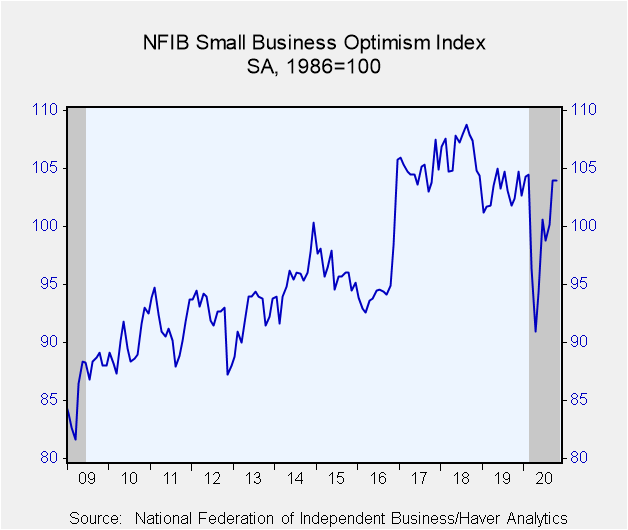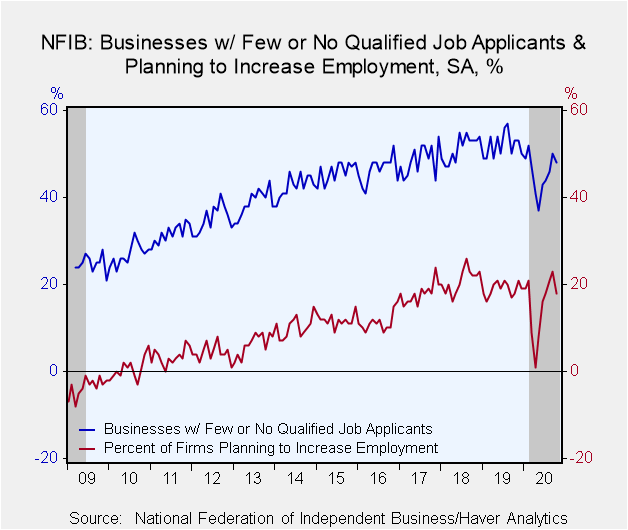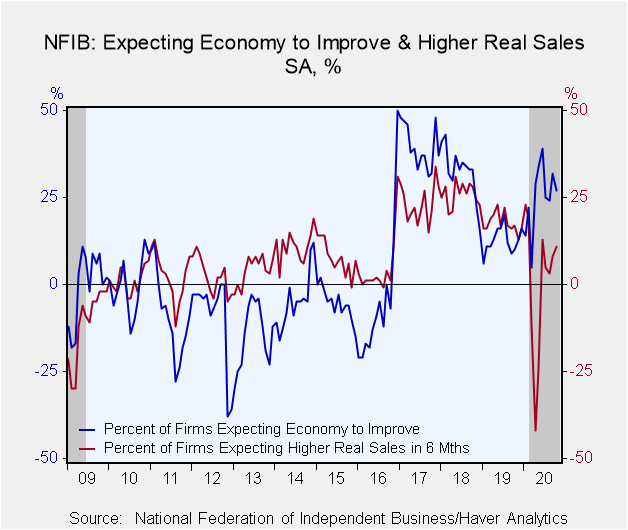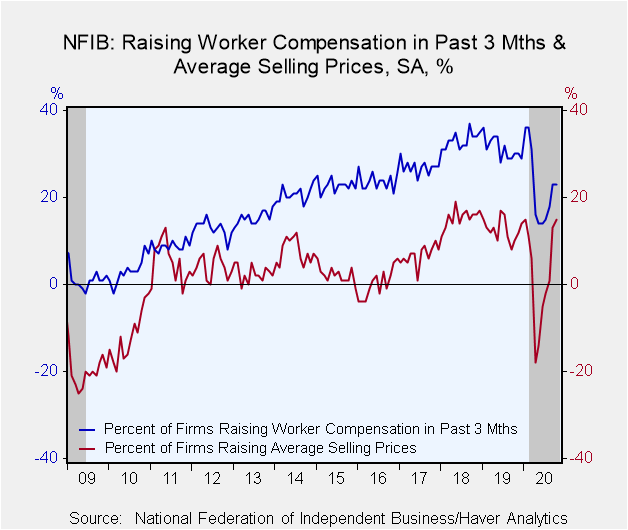 Global| Nov 10 2020
Global| Nov 10 2020U.S. Small Business Optimism Holds Steady During October
by:Tom Moeller
|in:Economy in Brief
Summary
• Stability in NFIB Small Business Optimism follows strong gains. • Employment readings ease. • Pricing gauges strengthen. The National Federation of Independent Business' (NFIB) Small Business Optimism Index held steady at 104.0 [...]
• Stability in NFIB Small Business Optimism follows strong gains.
• Employment readings ease.
• Pricing gauges strengthen.
The National Federation of Independent Business' (NFIB) Small Business Optimism Index held steady at 104.0 during October. It remained the highest level since February, up from the April low of 90.9.
A lessened net 27% of respondents felt that the economy would improved, down from 39% in June. A diminished net 18% of firms of firms planned to raise employment, the least in three months. A lessened 48% of firms found few or no qualified candidates to fill job openings. To the upside, a net 11% of firms expected higher real sales, the most since June. A steady net 13% thought that now was a good time to expand the business, up from three percent in April. Earnings trends improved greatly as the readings so far this quarter have risen to -3 from -12, up from June's -35.
Credit was a bit harder to get by a still low three percent of respondents, down from April's high of four percent.
Pricing power improved again. An increased net 15% of firms raised prices, the strongest reading since January and up from 18% who lowered prices in April. A net higher 20% were planning to raise prices in October, the most since February. A steady net 23% of firms raised worker compensation while a higher 18% planned to do so over the next three months, up from seven percent six months ago.
The most important issues for small businesses were the quality of labor (22%), taxes (17%) and poor sales (13%). The cost of labor troubled a lessened eight percent of respondents while competition from large businesses troubled a steady nine percent.
Roughly 24 million small businesses exist in the U.S. and they create 80% of all new jobs. The typical NFIB member employs 10 people and reports gross sales of about $500,000 a year. The NFIB figures can be found in Haver's SURVEYS database.
| National Federation of Independent Business (SA, Net % of Firms) | Oct | Sep | Aug | Oct'19 | 2019 | 2018 | 2017 |
|---|---|---|---|---|---|---|---|
| Small Business Optimism Index (1986=100) | 104.0 | 104.0 | 100.2 | 102.4 | 103.0 | 106.7 | 104.9 |
| Firms Expecting Economy to Improve | 27 | 32 | 24 | 10 | 13 | 32 | 39 |
| Firms Expecting Higher Real Sales | 11 | 8 | 3 | 17 | 18 | 26 | 23 |
| Firms Reporting Now Is a Good Time to Expand the Business | 13 | 13 | 12 | 23 | 25 | 30 | 23 |
| Firms Planning to Increase Employment | 18 | 23 | 21 | 18 | 19 | 21 | 18 |
| Firms With Few or No Qualified Applicants for Job Openings (%) | 48 | 50 | 46 | 53 | 52 | 51 | 49 |
| Earnings Trends | -3 | -12 | -25 | -8 | -5 | -2 | -11 |
| Firms Reporting that Credit Was Harder to Get | 3 | 2 | 1 | 4 | 4 | 4 | 4 |
| Firms Raising Average Selling Prices | 15 | 13 | 1 | 10 | 13 | 15 | 7 |
| Firms Raising Worker Compensation | 23 | 23 | 18 | 30 | 31 | 33 | 27 |
Tom Moeller
AuthorMore in Author Profile »Prior to joining Haver Analytics in 2000, Mr. Moeller worked as the Economist at Chancellor Capital Management from 1985 to 1999. There, he developed comprehensive economic forecasts and interpreted economic data for equity and fixed income portfolio managers. Also at Chancellor, Mr. Moeller worked as an equity analyst and was responsible for researching and rating companies in the economically sensitive automobile and housing industries for investment in Chancellor’s equity portfolio. Prior to joining Chancellor, Mr. Moeller was an Economist at Citibank from 1979 to 1984. He also analyzed pricing behavior in the metals industry for the Council on Wage and Price Stability in Washington, D.C. In 1999, Mr. Moeller received the award for most accurate forecast from the Forecasters' Club of New York. From 1990 to 1992 he was President of the New York Association for Business Economists. Mr. Moeller earned an M.B.A. in Finance from Fordham University, where he graduated in 1987. He holds a Bachelor of Arts in Economics from George Washington University.
More Economy in Brief
 Global| Feb 05 2026
Global| Feb 05 2026Charts of the Week: Balanced Policy, Resilient Data and AI Narratives
by:Andrew Cates










